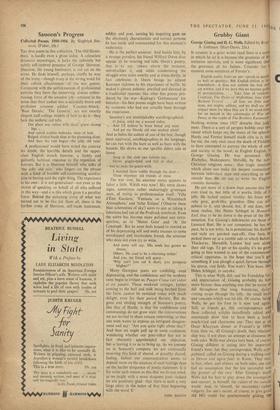Grubby Giant
George Gissing and MG. Wells. Edited by Roy A. Gettman. (Hart-Davis, 25s.)
IF GISSING is a great writer (and there is a sense in which he is) it is because the greatness of hit intention survives, and is more significant than the greatness of his failure. Consider for moment some sentences of Forster's: English poetry fears no one---excels in quality as Well as quantity. But English .fiction is less triumphant: it does not contain the best stuff yet written, and if we deny this we become guilty of provincialism. . . . Take four at random: Cranford, The Heart of Midlothian, lane Eyre. Richard Feverel . . . all four are little man' sions, not mighty edifices, and we shall see and respect them for what they are if we stand Own for an instant in the colonnades of War and Peace, or the vaults of The Brothers Karaniazov.
Nothing written since 1927 disturbs that judg- ment. There is a sort of perspex bubble over this island which keeps out the music of the spheres. Hardy and Forster himself made rifts in it, but for me, the only man since the death of Fielding to have attempted to portray the whole of man and society in the novel, in English English. is George Gissing. He was possessed, like fEschylus, Shakespeare, Melville, by the non' Christian religious sense: that tragic intuition which alone can make the deepest connections between individual man and everything in and outside him. He set out to write the English comedic humaine.
He put more of it down than anyone else has ever tried to, but little of it works, little of if jells. He lacked animal vitality; his force was
only grey, grub-like, graceless. One can still submit to it, and should, but, if one does, one
must realise, like Helen Schlegel in HowardS End, that to be let down is the price of the illu- mination. For Gissing's deficiencies are those of Leonard Bast. He is not competent, he has no pace, he is not witty, he is pretentious; his diction and style are patched cast-offs. One feels he picked them up at a jumble sale to which Balzac, Thackeray, Meredith, Landor had sent along their old togs. To get at• his quality it's no good going to him wained to any of the conventional critical apparatus, in the hope that you'll gel something if you plough a quick furrow through his sparse, vast fields. You won't. You have, Ike Helen Schlegel, to unyoke.
This is what Wells did; and his friendship for, and appreciation of, GiSsing probably do Hill more honour than anything else that he wrote or did throughout that long, boisterous, daisy' cutting swipe through the lolly, the small ha irs and concepts which was his life. Of course, being Wells, he put his foot in it now and again• Still, as friends go. this correspondence and these collected articles (excellently edited and annotated) shOw him to have been a loyal, much-tried and cheersome one.. They met at an Omar Khayyam dinner at Frascati's in 1896; from then on, till Gissing's death, their relation- ship was, if not close, an attempt at closeness on both sides. Wells was always very busy, of course. Gissing diffident at eating into his important friend's time; but they corresponded, Wells sym- pathised. called on Gissing during a walking tour in Devon and again .later in Rome. They met. in fact, often; and always, on both sides, one can feel an assumption that the less successful was the greater' of the two. After Gissing's death Wells did his best to play down the 'assumption and reassert, in himself, the values Of the outside world. And, in himself, he succeeded,' rather vulgarly, for one's meant, of course, to give good old HG credit for posthumously gilding the
wings of the lame duck. Yet the 'Impression' he wrote on Gissing's death remains (to use Giss- ing's favourite and tragically inadequate word) a `noble' enough tribute from a successful writer to a colleague--whatever Wells may privately have said and written.
For, however much he baulked, he saw that what Gissing was trying to do was to catch that clash of space and time which was nineteenth- century England and hold it in his mirror, all his characters reflected and illuminated there. This is Gissing's unique triumph: Dickens's—and most English novelists'—characters are like so many bright baubles sewn on to avoid because most English novelists have no real concept of social forces; Gissing's characters are less bright beads, but the London they move against is one of the greatest characters of English fiction. It has in it the ultimate white-darkness of Moby Dick; it's more concrete, more realised than Dostoievsky's St. Petersburg; it's the nearest that anyone has ever got to Lear's heath. The people in it are seen, however dimly, however long- windedly, against time, against space; and what Gissing has to give, however grubbily and dis- tantly, is authentic catharsis.
Wells was one of the very first to perceive something of this depth in his friend's novels beneath their tired and rebarbative surfaces. All honour to him.
MARTIN SHUTTLEWORTH



































 Previous page
Previous page